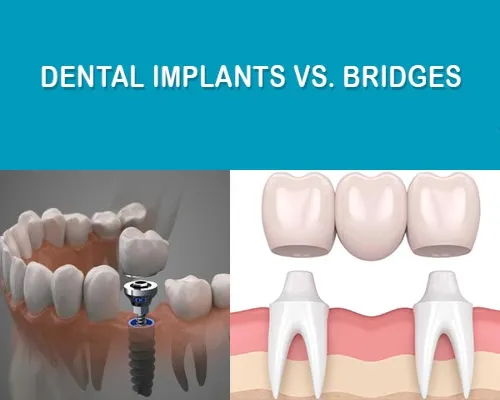Missing teeth treatment
If you are missing a row of teeth, you have the option to choose between traditional and implant-supported bridges. Improvements in dental restoration have led to more options for restoring teeth with dental implants. Both traditional and implant bridges have their advantages, but how can you tell which is the best option for your unique situation? Continue reading to find out.
Need to replace missing teeth
Missing teeth is detrimental to oral health. Apart from making a smile look less attractive, it also affects the ability to bite or bite properly. The entire structure of the oral cavity works in alignment – gums, teeth, jaw, and jaw joints. Missing teeth treatment
When a structure does not perform well, the effects can spread to other areas. For example, tooth loss can cause adjacent teeth to start shifting, which can lead to tooth misalignment, leading to oral health problems such as gum recession, gum disease, bruxism, and TMJ disorders. Therefore, replacing a missing tooth is essential for oral health. Missing teeth treatment
Choosing between implant-supported bridges and traditional bridges depends on various factors, including your oral health, budget, and personal preferences. Let’s break down the key differences between the two to help you make an informed decision:
- Implant-Supported Bridges:
Structure: Implant-supported bridges are anchored to dental implants, which are titanium posts surgically placed into the jawbone. These implants perform as artificial tooth roots.
Durability: They are highly stable and durable, often lasting a lifetime with proper care.
Adjacent Teeth Preservation: Since they do not rely on adjacent natural teeth for support, adjacent teeth are preserved. Missing teeth treatment
Bone Health: Implants arouse the jawbone, stopping bone loss.
Oral Health: They are easy to clean and maintain, promoting good oral hygiene.
Cost: Implant-supported bridges tend to be more expensive initially due to the surgical procedure for implant placement.
Procedure Time: The process usually takes longer as it involves multiple steps, including the healing period after implant placement. Missing teeth treatment
- Traditional Bridges:
Structure: Traditional bridges are supported by adjacent natural teeth, which are typically filed down to accommodate the bridge.
Durability: They are durable but may need to be replaced after 10-15 years on average.
Adjacent Teeth Impact: The adjacent natural teeth are altered (reduced) to support the bridge, which may weaken them. Missing teeth treatment
Bone Health: They do not stimulate the jawbone, which can lead to bone loss over time.
Oral Health: Cleaning underneath the bridge can be challenging, potentially leading to hygiene issues in the long run.
Cost: Traditional bridges are generally more affordable upfront compared to implant-supported bridges. Missing teeth treatment
Procedure Time: The process is usually faster compared to implant-supported bridges.
Factors to Consider:
- Oral Health: If you have healthy adjacent teeth and a strong jawbone, traditional bridges might be a suitable option. However, if you have missing teeth and want to preserve your jawbone, implant-supported bridges may be a better choice.
- Budget: Consider your budget, as implant-supported bridges tend to have a higher initial cost compared to traditional bridges. Missing teeth treatment
- Long-Term Considerations: If you’re looking for a long-term solution with minimal maintenance, implant-supported bridges are an excellent choice. They offer exceptional stability and durability.
- Timeframe: If you’re looking for a quicker solution, traditional bridges might be the better option. Implant-supported bridges require a longer treatment time due to the healing period after implant placement. Missing teeth treatment
- Adjacent Teeth Health: If you have strong adjacent teeth, you might prefer traditional bridges. If these teeth are weakened or have extensive dental work, implant-supported bridges might be a better option.
Ultimately, it’s crucial to consult with a qualified dentist in Nashik or a prosthodontist who can evaluate your specific case and provide personalized recommendations based on your oral health, budget, and preferences. They can help you make an informed decision that aligns with your needs and goals.



